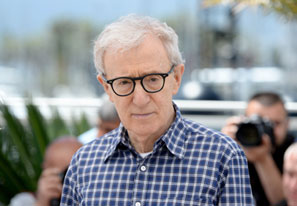
Woody: The Biography, by David Evanier (St. Martin‘s Press, 384 pp., $27.99)
Biographies of living people can be divided into two categories—authorized and unauthorized. Unauthorized biographies, in turn, can be divided into two categories—hagiographic and candid. Candid biographies can be classified as scabrous or sympathetic. David Evanier’s portrait of Woody Allen tumbles headlong into the last group.
Finally, a reason to check your email.
Sign up for our free newsletter today.
Woody’s awed narrative tracks the filmmaker from his Brooklyn beginnings as Allan Konigsberg to his growth as a comedy writer and standup comedian now billed as Woody Allen, and, finally, to his status as a much-lauded auteur. At the dawn of his career, the jittery performer showed audiences a gleaming gold timepiece. “My grandfather,” went his hesitant delivery, “on his deathbed . . . sold me this watch.” A funny line, but the comic had a hidden reason for glancing at the prop. He could see how many minutes remained before his exit. It’s this mix of humor and calculation that defines Woody Allen. Though the young comedian was sophisticated, athletic, and attractive to women he knew there was no way he could compete with Hollywood’s leading men—even the hilarious ones like Bob Hope and Danny Kaye. So his film persona became that of a craven naïf who never got to first base with his dates. Indeed, he rarely left home plate.
Many Jewish comedians, ranging from Groucho Marx to Alan King, preceded Allen. But their ethnicity was beside the point; with Woody Allen, it was the point. In various movies he has appeared as a rabbi, a Hassid, and a victim of anti-Semitism avidly pursuing shixas like Diane Keaton, Mariel Hemingway, and Mia Farrow. Young, hip audiences were open to new comedy, and Allen became their anti-superhero. Always a workaholic, Allen rarely took a day off from his phenomenal production of stage and screen comedies, short stories, parodies, and a long parade of quips. Two generations later, these continue to make the rounds of watercoolers and campuses: “The lion and the calf shall lie down together, but the calf won’t get much sleep.” “I took a speed reading course and read War and Peace in 20 minutes. It involves Russia.” “Mankind faces a crossroads. One path leads to despair and utter hopelessness. The other, to total extinction. Let us pray we have the wisdom to choose correctly.”
Quips weren’t enough. Allen yearned to be taken seriously as an artist and as an analyst of contemporary society. Some of his films deliberately traded laughter for homages to the great European directors. Stardust Memories, for example, was a sedulous imitation of Federico Fellini; Interiors aped the stark pessimism of Ingmar Bergman. But there were also features of striking—if flawed—originality: Broadway Danny Rose, Annie Hall, Crimes and Misdemeanors. All this should have made him a pantheon figure in American cinema. But as the public would learn, there was another Woody Allen, and this one was nowhere as diverting as his oeuvre.
Following at a discreet distance, the biographer charts the filmmaker’s numerous affairs with very young women as well as his three marriages. The third, now in its 18th year, was to Soon Yi Previn. Abandoned in Korea as a child, Soon Yi had been adopted by Mia Farrow and her then-husband, conductor Andre Previn. After divorcing Previn, Farrow hooked up with Allen for more than a decade. In 1991, Mia came across nude photos of Soon Yi and realized that Allen had shot them, and that he had been having sexual relations with a young woman who was emotionally, if not legally, his daughter. She went public with this information—“An atrocity has been committed against our family,” she said—as well as the explosive allegation that Allen had sexually abused seven-year-old Dylan Farrow. The shock waves reverberated for a dozen years. When they subsided, Allen’s most fervent admirers began to make comparisons with Charlie Chaplin. Wasn’t that protean director/actor a notorious cradle-robber, too? And didn’t he also marry a teenager young enough to be his granddaughter? And didn’t that marriage endure?
After a slew of box office duds like The Jade Scorpion and Celebrity, Allen came up with another international crowd pleaser, Midnight in Paris. Woody Allen film festivals unreeled again in Europe and America. His reputation had been restored. Or had it? Evanier pads shamelessly, filling his book with a long interview with Allen’s colleague, Dick Cavett, interminable quotes from movie critics, and the recollections of childhood classmates. He also gushes about Allen’s “brilliance, his magic, his movies that continue to move and inspire us no matter how often we see them, his capacity for endless invention—this writer for all seasons, this filmmaker has touched the entire world.”
The biographer is far more indulgent than his subject. “Many of my films,” Allen has remarked, “are enjoyable by the mean standards of movies, but look at what has been accomplished by people who have done beautiful things—Kurosawa, Bergman, Fellini, Buñuel—and then look at my films. I have squandered my opportunities, and I have nobody to blame but myself.” After some 50 features, that appraisal comes closer to the truth than the adoring Woody: The Biography. As Allen passes his 80th birthday, he remains a phenomenally productive but oddly disappointing filmmaker—a master without a masterpiece.